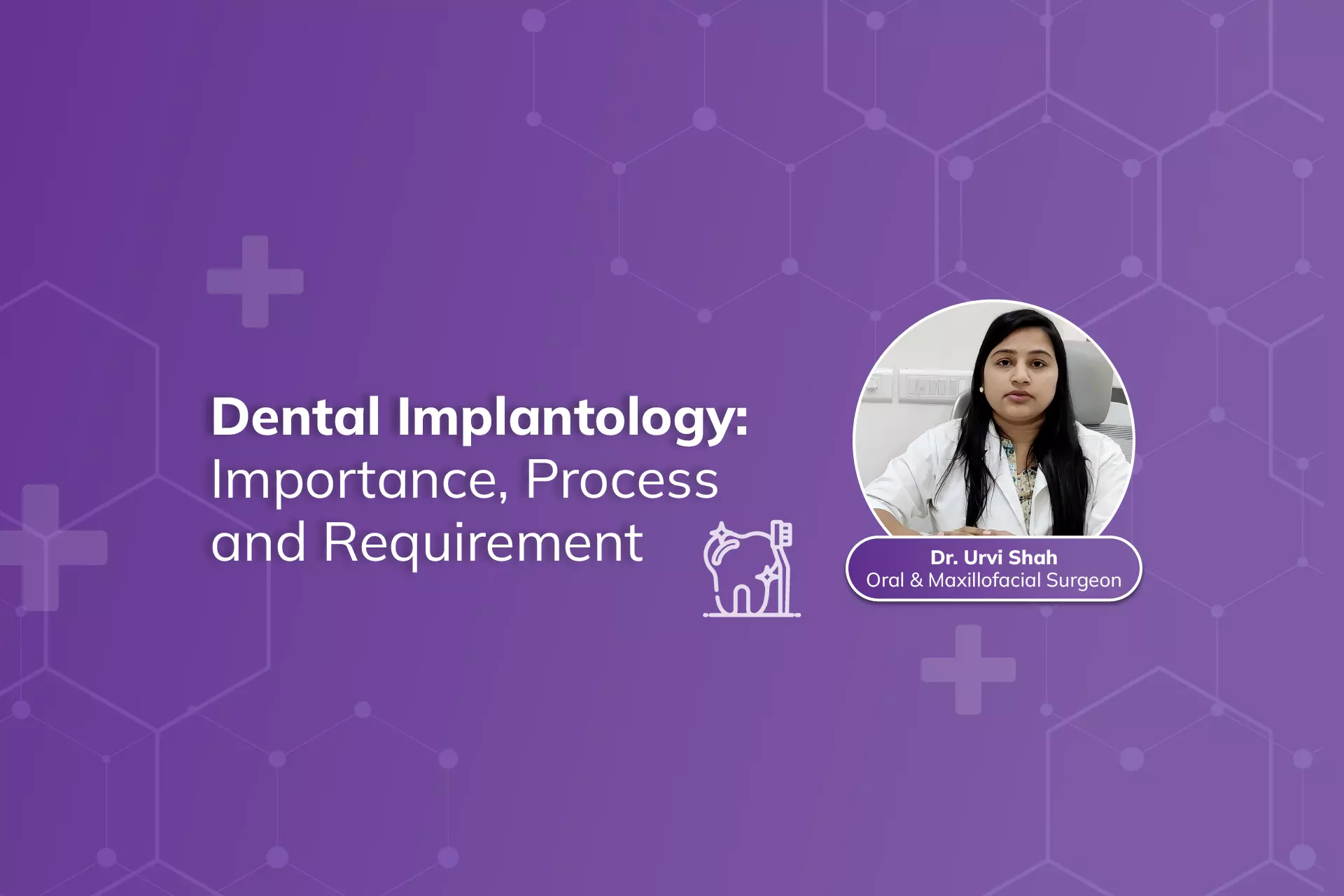Dentist | 5 min read
Dental Implantology: Importance and Process by Dr. Urvi Shah
Medically reviewed by
Table of Content
Synopsis
Learn about the importance of dental implantology, its benefits for aesthetics and functionality, and potential risks and complications with effective solutions by popular Oral and Maxillofacial Surgeon Dr. Urvi Shah.
Key Takeaways
- Dental implantology is specialized field of dentistry that offers a long-term natural-looking solution for missing teeth
- Dental implants can improve aesthetics, enhance functionality, and preserve jawbone density
- With proper care and maintenance, dental implants can last for many years and provide a natural-looking solution
What is Dental Implantology?
Dental implantology is a field of dentistry that involves the use of dental implants to replace missing teeth. Dental implants are small, titanium screws that are surgically placed into the jawbone to support a dental prosthesis such as a crown, bridge, or denture. To know more about the process of dental implantology and how it is done, we interviewed Dr. Urvi Shah, an Oral and Maxillofacial surgeon in Ahmedabad.
Importance of dental implantology
Missing teeth can cause a range of problems, from difficulty eating and speaking to a lack of self-confidence. Oral implantology provides a long-lasting and natural-looking solution for those who have lost teeth, helping to restore both function and aesthetics. Implants also help preserve jawbone density, which can prevent further dental problems in the future.
Process of Dental Implantology
Evaluation and planning
Dr. Urvi said, “Before a dental implant can be placed, the patient will need to undergo a thorough evaluation to determine if they are fit for the procedure. This may include a dental exam, medical history review, and imaging tests such as X-rays and CT scans.” The dentist will then work with the patient to develop a treatment plan that considers their needs and goals. “Only after examination can we determine if the procedure can be done in a single sitting or if it will be a two-stage procedure,” added Dr. Urvi.
Implant placement
“The first stage is placing the implant. The implant placement procedure typically involves making a small incision in the gum tissue to access the jawbone. A hole is then drilled into the bone, and the implant is inserted into the hole. The gum tissue is then sutured closed, and the patient is given time to heal,” said Dr. Urvi.
She added later, “If we go with the two-stage procedure, it might take 3-6 months for completion.”
Healing and integration
After the implant has been placed, the patient will need to allow time for the implant to heal and integrate with the jawbone. This process, known as osseointegration, typically takes several months. During this time, the patient will need to avoid putting pressure on the implant and maintain good oral hygiene to promote healing.
Final restoration
Once the implant has fully integrated with the jawbone, the patient will return to the dentist to have the final restoration placed. Depending on the patient's needs, this may include a crown, bridge or denture. The restoration will be custom-made to match the patient's natural teeth and ensure a comfortable fit. “Depending upon the patient’s condition, the surgery might take 30 minutes to three hours,” added Dr. Urvi.
Benefits of oral implantology
According to Dr. Urvi, “One of the key benefits of Oral Implantology is that it can be done at any age. If the patient is fit and healthy, the procedure can even be performed on an 80-year-old.” Some other benefits of oral implantology are as follows:
Improved aesthetics
Dental implants are designed to look and feel like natural teeth. They are custom-made to match the surrounding teeth' size, shape, and colour, making them virtually indistinguishable from natural teeth. This can greatly improve a patient's confidence, self-esteem, and overall appearance.
Enhanced functionality
Dental implants function just like natural teeth, allowing patients to chew and speak with ease. However, unlike dentures, which can slip or cause discomfort, dental implants are securely anchored to the jawbone, providing a stable and comfortable foundation for replacement teeth
Durability
Dental implants are incredibly durable and can last for many years with proper care. In fact, many dental implants can last a lifetime, making them a cost-effective long-term solution for missing teeth.
Preservation of jawbone density
When a tooth is missing, the bone that supports it can deteriorate over time. Dental implants are the only tooth replacement option to stimulate bone growth and preserve jawbone density. This helps maintain the shape and structure of the jaw, preventing future dental problems.
Dr Urvi said, “One additional benefit of oral implantology is that you can start eating 2-3 hours after the procedure. However, the gap of three hours is recommended to let the effects of the anaesthesia wear off.”
Dental Implantology Risks and Complications
Infection
Like any surgical procedure, there is a risk of infection with dental implant surgery. “However, with proper pre-and post-operative care, the risk of infection can be minimized. We recommend you maintain oral hygiene after the procedure to prevent the risk of developing an infection,” added Dr. Urvi.
Nerve damage
In rare cases, dental implant surgery can damage nearby nerves, which can cause numbness or tingling in the lips, tongue, or cheeks. However, this is a rare complication and can often be avoided with careful planning and execution of the surgery.
Implant failure
Dental implant failure can occur due to a variety of reasons, including infection, poor bone quality, or improper placement of the implant. However, with careful planning and execution of the surgery, the risk of implant failure can be minimized.
Allergic reactions
Some patients may be allergic to the materials used in dental implants, such as titanium or zirconia. However, this is a rare complication and can often be avoided by using alternative materials or conducting allergy testing before surgery.
According to Dr. Urvi, “Dental implant surgery is not painful. In addition, the post-operative pain can be controlled by prescribed medication.” In conclusion, oral implantology has revolutionized the way we restore missing teeth, providing patients with a long-term, cost-effective, and natural-looking solution. While some risks and complications are associated with dental implant surgery, these can often be minimized with careful planning and execution of the procedure.
Ultimately, oral implantology offers numerous benefits to patients, including improved aesthetics, enhanced functionality, durability, and preservation of jawbone density. Dental implants may be the right solution for you if you are missing one or more teeth. Talk to your dentist today to learn more about the process and whether it's right for you on Bajaj Finserv Health.
References
Disclaimer
Please note that this article is solely meant for informational purposes and Bajaj Finserv Health Limited (“BFHL”) does not shoulder any responsibility of the views/advice/information expressed/given by the writer/reviewer/originator. This article should not be considered as a substitute for any medical advice, diagnosis or treatment. Always consult with your trusted physician/qualified healthcare professional to evaluate your medical condition. The above article has been reviewed by a qualified doctor and BFHL is not responsible for any damages for any information or services provided by any third party.





